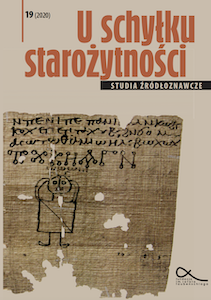Prodigium, portentum, ostentum, monstrum: In search of meaning between practice and definition
Prodigium, portentum, ostentum, monstrum: In search of meaning between practice and definition
Author(s): Dominika LewandowskaSubject(s): History, Ancient World, Theology and Religion, History of Religion
Published by: Fundacja im. Rafała Taubenschlaga
Keywords: prodigium;portentum;ostentum;monstrum;omen;Festus;definition;divination;
Summary/Abstract: The article is focused on analysing the occurrences of four terms used in the sources: prodigium, portentum, ostentum, monstrum, and confronting the results with ancient definitions of these terms. In the first part, a total of 1,489 attestations were collected and their occurrences were analysed according to ‘divinatory’ and ‘various’ contexts and in relation to source categories: ‘Historiography’, ‘Poetry’, ‘Drama’, ‘Prose’, ‘Philosophy and Rhetoric’, ‘Technical’, ‘Grammatical’, ‘Legal’, and selected ‘Early Christian’. The second part focuses on analysing the definitions of the terms in question, which are divided into: ‘Etymological definitions’, ‘Indicating referent (denotation)’, ‘Indicating connotation’, and ‘Hybrid’. It has been shown that only half of the studied terms belong to the ‘divinatory’ context; a clear preference can be observed for the use of specific terms when taking into account the category of sources; ostentum is the most homogenous in meaning, and the greatest disproportion between ‘divinatory’ and ‘various’ meaning (in favour of the latter) shows monstrum.
Journal: U schyłku starożytności - Studia źródłoznawcze
- Issue Year: 2020
- Issue No: XIX
- Page Range: 3-60
- Page Count: 58
- Language: English

